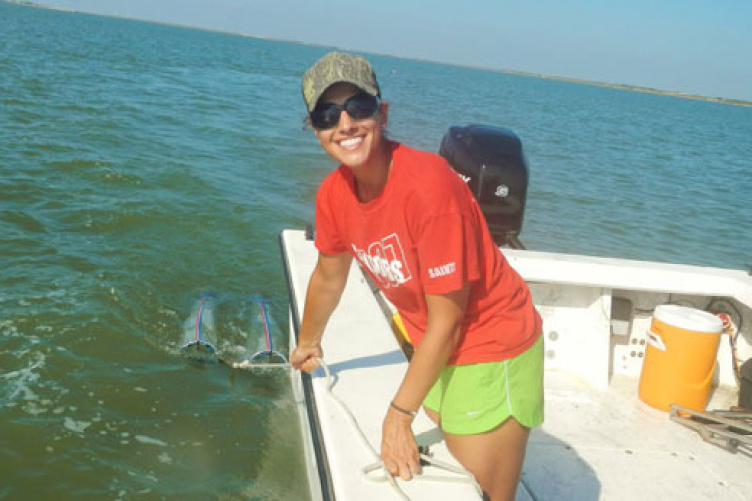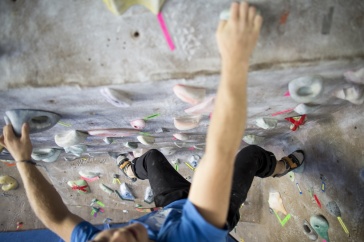
“Hey y’all!” blogs Catherine Buchalski, a TIDES (Training for the Integration of Decision-Making and Ecosystems Science) intern at the Mission-Aransas National Estuarine Research Reserve in Texas. Since June this UNH graduate student has picked up the lingo while immersing herself in the issues, both environmental and societal, that affect this particular estuary.
Buchalski has incorporated her learning about the Texas estuary into many diverse activities to facilitate outreach to stakeholders: regional events, project workshops, the development of web-based tools, and the production of informational videos. Because she loves field-based science, Buchalski has also pitched in on research projects at Mission-Aransas Reserve, gathering plankton and mapping the encroachment of black mangroves.
She applied to the TIDES program after meeting and talking with professor Mimi Becker, director of the program.
“We had this fantastic phone discussion about how so much valuable environmental science is occurring but is virtually unknown to the public,” says Buchalski, who earned her undergraduate degree in biology. “I’m a people person, and I really wanted to explore how we can make that communication happen between the public sphere and the world of research.”
The two-year master’s degree program combines one year of coursework in environmental and social sciences with an extended internship at one of the 28 estuaries within the National Estuarine Research Reserve System.
Related LinksBalancing Freshwater Needs in a Changing Environment |
During the first year, Buchalski and fellow classmates learned about an estuary in the National Estuarine Research Reserve System (NERRS) that almost surrounds UNH, Great Bay. The estuary is the site of much ongoing UNH research on subjects ranging from lobsters to oysters to eelgrass. And, as with each of the estuaries in the NERRS, Great Bay has its challenges, which are, both environmental and societal.
“In Great Bay, the challenge is communicating out to the public about the problem of nitrogen loading and that’s related to development,” says Buchalski. “The Mission-Aransas Reserve’s challenge is how to maintain freshwater inflows to the estuary. In New Hampshire, you just turn on the tap and don’t think about it. But down here freshwater is a huge deal.”
Texas is doing well economically, and Buchalski notes that growth for the city of San Antonio is projected to be massive and will put even more pressure on the availability of freshwater.
“San Antonio is just three hours north of the Mission-Aransas Reserve. If no freshwater comes down our rivers,” says Buchalski, “the salinity here will skyrocket.”
Getting stakeholders to the table early and often is, as Buchalski has learned, a great way to foster honest and meaningful dialogue. Oftentimes, there are untapped sources of information within the community and other agencies. To facilitate the discussion at these and other meetings, Buchalski produced a short video entitled, “Balancing Freshwater Needs in a Changing Environment.”
Getting the people into environmental science is one of Buchalski’s passions. “We ask people what is important in your life? For example, if it’s a fisherman, is it a crab or fish species that’s critical?” says Buchalski. “We try and show with computer modeling, how that species might be affected by a freshwater inflow shortage. We need to work with the public to make sure that there’s enough water for the environment and for people.”
Her classmates and fellow bloggers, Emily Troisi and Meg Gardner, share Buchalski’s point of view and contribute posts about their estuary challenges and experiences on the Outgoing TIDES blog as well. Troisi is at Rookery Bay in Naples, Fla., and Gardner is at Waquoit Bay in Cape Cod, Mass.
As Buchalski writes: “We have learned to love collaboration. … Knowing that there is a consistent support network which I trust and feel comfortable with, makes it much easier to bounce around new concepts and ideas.”
Their collaboration has been so successful that they’ve even thought of working together as consultants.
But for now, after graduating this spring, Buchalski has her eye on the West Coast: “I’m particularly interested in using my communication and facilitation skills to work with an underserved coastal community.”
Originally published by:
UNH Today
Photos courtesy Catherine Buchalski
















































